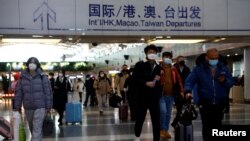Chinese and international airlines are reviewing schedules and coping with a flood of inquiries about travel to China following this week’s announcement that strict quarantine requirements for arriving travelers will be dropped early next month.
According to the Chinese state-run media the Beijing News and Cailian Press, data from the Chinese travel website "Ctrip" shows that searches for popular cross-border destinations, including Macau, Hong Kong, Japan, Thailand, South Korea and the United States, increased tenfold within a half-hour after Monday’s announcement.
Searches related to outbound and group tours during the Spring Festival have increased sixfold.
According to Bloomberg, Hong Kong residents also rushed to the internet to search for flights to key mainland cities, with Shanghai, Beijing and Hangzhou being the most searched cities.
The decision to drop quarantine rules for inbound travelers comes after three years of strict international travel control as part of the country’s signature zero-COVID campaign.
The Chinese National Health Commission announced that the new measures will start on January 8.
"Those who come to China should undergo a nucleic acid test 48 hours before their departure, and those with a negative result can come to China without applying for a health code from our embassy or consulate abroad," according to a document from the NHC. Arrivals into China with negative nucleic acid tests will be able to “enter society.”
The new order also requires all localities to "orderly resume Chinese citizens' outbound tourism."
In response, U.S. carrier United Airlines; European airlines company Lufthansa Group, which includes SWISS and Austrian Airlines; and Philippine Airlines announced they are looking into resuming additional flight operations to mainland China.
A staffer at Lexiang travel agency in the Flushing neighborhood of Queens in New York City, told VOA Mandarin that she has seen about a 30% increase of the number of travel inquiries to China. She provided only her family name, Wang, because she doesn’t want to attract attention from the Chinese authorities.
She said dozens of people have contacted her since the announcement to inquire about getting a Chinese visa or booking a flight to China.
A staffer at another Flushing travel agency who doesn’t want to reveal his identity because he doesn’t want to draw attention, told VOA Mandarin that more than a dozen people have reached out to the agency for information about getting a Chinese visa or COVID-related information for traveling in China since Monday’s announcement. He said there were barely any such inquiries in the past three years.
He said that most of the people who reached out to the firm are considering traveling to China to visit sick family members, rather than to celebrate the upcoming Lunar New Year.
He said that since the airlines haven’t started to add more flights, fares are still high and China hasn’t resumed issuing multi-entry visas, so people who want to travel still can’t just pack and go.
Reactions vary
China’s decision has been met with mixed reactions from Chinese netizens on social media.
Some celebrated the end of the quarantine rules, which clears the way for them to travel overseas.
"A long, long nightmare, I finally woke up," one commented.
"A ridiculous era has finally come to an end," said another commenter.
However, some commenters doubt whether easing regulations will repair the damage done in the past three years.
"There is no such thing as 'everything goes back to the way it was.' The lives of countless people have been completely changed, and they can only bite the bullet and live in this parallel timeline. It’s like they broke a mirror and then glued it back together, it’s not the same mirror as before,” said one comment on Weibo, the Chinese version of Twitter.
Three years of Chinese government propaganda insisting on zero-COVID and highlighting the dangers of the virus have made many netizens feel uncomfortable with the sudden “opening up.” They worry that the move will worsen the current outbreak.
"A smorgasbord of strains is coming," wrote one commenter.
Some consider virus a biological weapon
Many nationalists have bought into a conspiracy theory that the coronavirus is a biological weapon developed by the United States to attack China; they fear that opening China will make it easier for the U.S. to attack again.
“It’s time to come to China to poison,” said one comment.
Others seem to look forward to a move that could spread the virus from China to other countries.
"Spread the virus all over the world!! No one gets left behind!” said one comment. “Europe, America, Japan, South Korea and India! Every single one! Don't even think about running away!"





